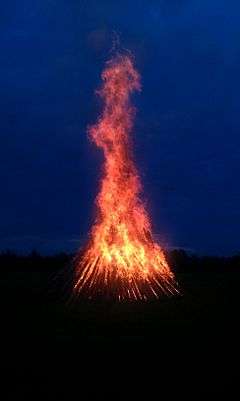Jaanipäev
| Jaanipäev | |
|---|---|
 | |
| Begins | June 23 |
| Ends | June 24 |
| Date | June 24 |
| Next time | 24 June 2017 |
| Frequency | annual |
Jaanipäev is the longest celebrated public holiday in Estonia. On Jaaniõhtu (the night of Jaanilaupäev and the night before Jaanipäev) Estonians all around the country will gather with their families, or at larger events to celebrate this important day with singing and dancing, drinking and eating and lighting the bonfires, as Estonians have done for centuries. Jaanipäev is arguably the most important holiday, more important than Christmas in the yearly calendar for Estonians.[1]
Name
Jaanipäev in Estonian, loosely translated to English Jaan's day is called Midsummerday in English, Juhannuspäivä by Finnish, Jāņu diena by Latvians and St John's Day by the Christians. There are several other less known names for Jaanipäev in Estonian, some of them are: leedopäev, suvine pööripäiv, suvepööripäev, püäripääv, päevakäänak, päiväkäänäk, päiväkäändjäne, päevapesa, pesapäev and suured päevad.
Beginning
It is said that the traditions of Jaanipäev started with the fall of the Kaali meteorite around 4,000 years ago,[2] lighting of bonfires to re-enact the falling of the meteorite when it lit the night said to seem light the sun rose again in the night.
Victory Day
Jaanipäev celebrations were merged with the celebration of Võidupüha (Victory Day) during the War of Independence when Estonian forces defeated the German troops on 23 June 1919. After this battle against Estonia's traditional oppressors, Jaaniõhtu and the lighting of the traditional bonfires became linked with the ideals of independence and freedom. Since 1934, June 23 is also national Victory Day of Estonia and both 23rd and 24th are holidays and flag days. The Estonian flag is not lowered in the night between these two days.
The tradition before the Soviet occupation, which has now been restored, was for a fire to be lit by the Estonian President on the morning of Võidupüha (June 23). From this fire, the flame of independence was carried across the country to light the many bonfires. During the transition to the re-establishment of Estonia's de facto independence, Jaanipäev became an unofficial holiday, with many work places closing down. It once again became an official national holiday in 1992.
Traditions & rituals
On Jaaniõhtu, Estonians all around the country will gather with their families, or at larger events to celebrate this important day with singing and dancing and lighting the bonfires, as Estonians have done for centuries.
Understandably, some of the rituals of Jaanipäev have very strong folkloric roots. The best-known ritual is the lighting of the bonfire and then jumping over it. This is seen as a way of guaranteeing prosperity and avoiding bad luck. Likewise, to not light the fire is to invite the destruction of your house by fire. The fire also frightened away mischievous spirits who avoided it at all costs, thus ensuring a good harvest. So, the bigger the fire, the further the mischievous spirits stayed away.
Midsummer's eve is important for lovers. Among Estonian fairy tales and literature there is the tale of two lovers, Koit (dawn) and Hämarik (dusk). These two lovers see each other only once a year and exchange the briefest of kisses on the shortest night of the year. Earth-bound lovers go into the forest looking for the flower of the fern which is said to bloom only on that night. Also on this night, single people can follow a detailed set of instructions involving different flowers to see whom they are going to marry.
Also Jaanipäev marked a change in the farming year, specifically the break between the completion of spring sowing and the hard work of summer hay-making.
Christians
Since the arrival of Christianity, the day was named St John's Eve by the crusaders. To this day Christians still try to change the pagan beliefs and rituals as they name them (like lighting the bonfires and jumping over them, eating, drinking, singing and dancing all through the night, predicting the future and some other romantic traditions).
See also
- Midsummer
- Jāņi (Latvia)
- Joninės (Lithuania)
- St John's Day (Estonia) (Christians)
References
- ↑ Also celebrated in Finland, Sweden and Latvia at different degrees.
- ↑ Former President Lennart Meri as historian, suggested that in his 1976 book, 'Silverwhite'
External Links & References
ERR (Estonian Public Broadcasting) - Jaanipäev: Estonia's Most Important Holiday Decoded
More info and detailed list of traditions of Jaanipäev (In Estonian)